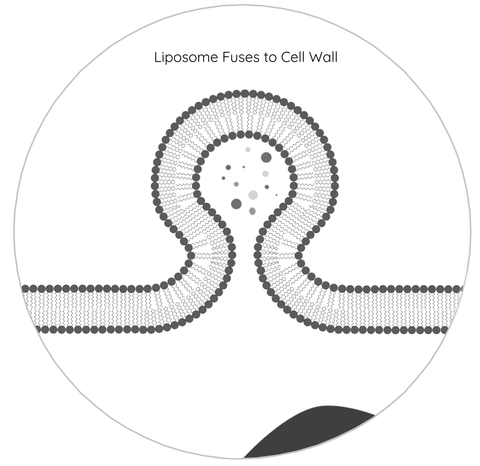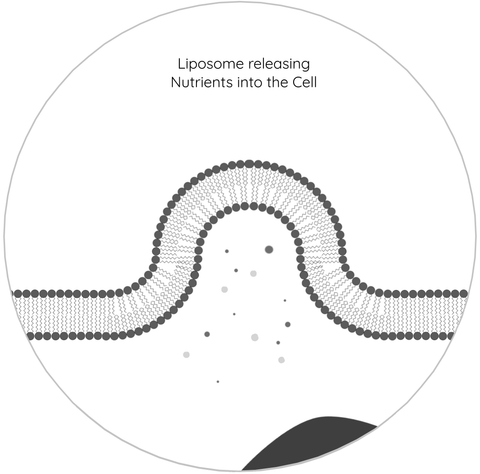Liposomes are changing the way our bodies absorb plant substances, vitamins, and minerals.
Simply put, Liposomes are micro-bubbles with a phospholipid membrane, the same material that surrounds our own cells, which envelope nutrients submersed in water, trapping them inside. Due to the physiological indifference of the membranes, the body recognises and transports the orally consumed liposomal bubbles into our blood stream, delivering the nutrients directly into our cells.
Most people assume their gastrointestinal tract works properly to digest food and supplements to absorb nutrients effectively i.e. highly bioavailable system. Unfortunately, many are not. Factors like stress, alcohol, high sugar, age, medicines etc, even the composition of nutrients such as powder, capsules, tablet with binders and fillers, affect how they are absorbed into the body. The bioavailability of some nutrients is so low, that they can be destroyed in the gastrointestinal tract.
The clever part of a Liposome is in their ability to form a protective barrier around the nutrients, which bypass the digestive process, remaining undamaged, until they are absorbed directly into the bloodstream. From there, the phospholipid membrane layer allows the Liposomes to join on to nutrient deficient cells, quickly releasing core nutrients to achieve a higher cellular nutrient uptake.
Whilst a fairly new phenomena in the dietary supplement arena, which is currently turning the market of traditional dietary supplementation on its head, Liposomes have in fact been around for nearly 30 years. They were first discovered by the British haematologist Dr. Alec D Bangham in 1964 (Published 1965), at the Babraham Institute in Cambridge. Then later clinically approved for use in wide scale targeted delivery of therapy drugs in the early 1990’s.
So why now, is liposomal technology an important new and exciting development? This is largely due to growing realisation that on the packet of a food or supplement products, when it says it contains ‘x’ amount of a particular nutrient, it does not mean we will absorb all of it. Our foods are also not as rich in nutrients as they once were, prompting the need for effective nutrient supplementation.

Whilst some articles over dramatize the true extent of Nutrient depletion, within our foods, there is clearly something to be concerned about. Over farming of land results in soil mineral loss, which decreases vegetable, fruit, or grain mineral nutrient content. In a recent study in India, a country we import a lot of fruit and vegetables from, found Iron, thiamine (vitamin B1), magnesium and zinc have reduced by an astounding 41-56 per cent in cabbages. In ripe tomatoes, thiamine, iron, and zinc have reduced by 66-73 per cent.
Some even question whether the 5-a-day fruit and veg concept is even enough now to support a healthy body and mind. France recommends 10 portions, Canada 5—10, whilst Denmark encourages people to aim for 6. And Japan encourages a whopping 17 portions (at 50g as opposed to UK’s 80g)
A recent 12 year study by UCL, followed the eating habits of 65,000 people and of those who ate at least 7 portions of fruit and vegetables a day were shown to be 42% less likely to die from any cause over the 12-year period of the study.
How can we therefore be sure we are getting the necessary nutrients that our bodies need to function properly? It almost makes it an essential requirement to take food supplements like vitamins, amino acids, minerals, and herbal extracts.
According to a study conducted in 2018 among 2000 UK consumers, 59% reported to be taking a multivitamin, mineral, or other food supplements.
In the same year, spending on food supplements was at an all-time high, standing at £442 million. This only shows that supplements play an important role in providing additional nutrients to our diet, lowering the risk of various health problems.

The debate about effectiveness of food supplements is pushing Liposomes to forefront. Might you have taken a supplement and felt that it did not work, despite what it says on the label? For instance, standard CoQ10 or Glutathione, in a powder, capsule or tablet form is about as useful as eating soup with a fork, as it is easily degraded on consumption and not absorbed into the body easily. With vitamin C only some of these nutrients reach the bloodstream for onward distribution. For instance, research shows that the body absorbs only 14-30% of vitamin C in standard form.
Liposomes present a solution to nutrient absorption in the body by ensuring that they can be utilized to their full potential. This takes the guesswork out of the efficacy of food supplements. 
What is the science around liposomes?
Liposomes are microscopic cell-like phospholipids (fat molecules) that have a head and two tails, which when introduced to water, string together to form a double membrane (vesicle) like our own cell membranes. The double membrane is cleverly constructed with an ‘inner’ and ‘outer’ wall as the phospholipid tails jostle together to escape the water, placing the water loving heads facing the aqueous solution. With the tails joining but facing opposite each other, this creates a double layer of phospholipids. The bubble vesicle is created when the membrane seeks to close off any tail element from being exposed to water, trapping the water solubilised nutrients inside its core.

Because they are biocompatible, liposomes can carry water loving nutrients i.e. Vitamins C & B within the centre - or fat, water repelling nutrients i.e. Vitamin D & E, within the non-aqueous membrane wall.
It is important to note that not all liposomes are the same, and their effectiveness will depend on how they were manufactured and their size. Smaller liposomes have been seen to be more efficient at delivering nutrients at the cellular level due to their tiny vesicles. Similarly, the two-layer membrane is what makes liposomes unique. When a nutrient is inside the sphere, it cannot pass through it. Yet when the liposome merges with other cells, the nutrient is delivered easily. This allows them to be used for the ‘targeted’ and effective delivery of nutrients.
 |
 |
 |
Liposomes are a game-changer when it comes to the bioavailability of food supplements. They are quickly and efficiently absorbed in the body without coming into contact with stomach acids and harsh PH and oxidization in the gastrointestinal tract. The only other efficient way of delivering nutrients to the body is intravenous. Administration of injections is involving and must be done by qualified personnel. There is also a risk of infection and neither are they very convenient, albeit we do know that by passing the digestive system and placing nutrients straight into the blood stream, the biotherapeutic effects are evidently noted. Liposomes provide a way to deliver nutrients in a similar effective way orally without the need for third-party intervention. Similarly, it is possible to achieve higher bioavailability with lower doses because of fast and efficient absorption. Plus there is the benefit of more accurate dosing.
Welcome WA High-Quality Liposomal Supplements -The Most Affordable Liquid Vitamins in the UK, from Well.Actually.:

- Vitamin C- or ascorbic acid or the more non acidic form of Sodium or Calcium Ascorbate, is a potent antioxidant that protects cells from oxidative stress caused by free radicals. It also boosts immunity, promotes collagen formation and the absorption of iron. Visit Shop Page here.
- Glutathione- Glutathione is made up of three amino acids. It is known as ‘the master antioxidant’ for its ability to boost the functioning of other antioxidants, particularly vitamins C, E, and C0Q10. Glutathione helps to fight aging, detoxifies the body, and boosts energy production. Visit Shop Page here.
- Vitamin D3- The sunshine vitamin plays a crucial role in helping the body absorb calcium, vital for maintaining healthy bones and teeth. It also boosts immune function, cell division, and strengthens muscles. Offered as 1000IUs and 2000IUs. Visit Shop Page here.
External References





